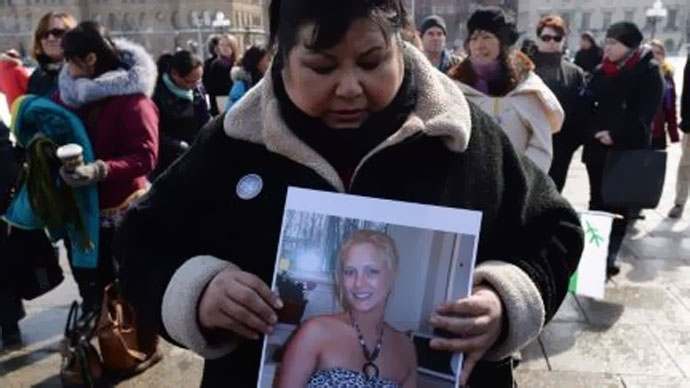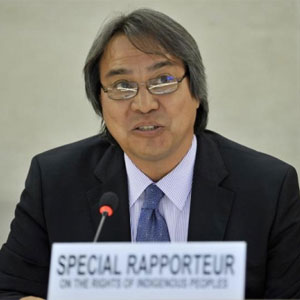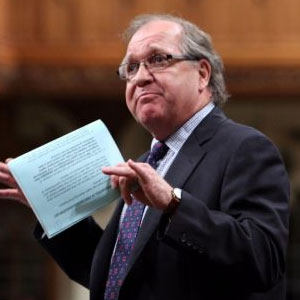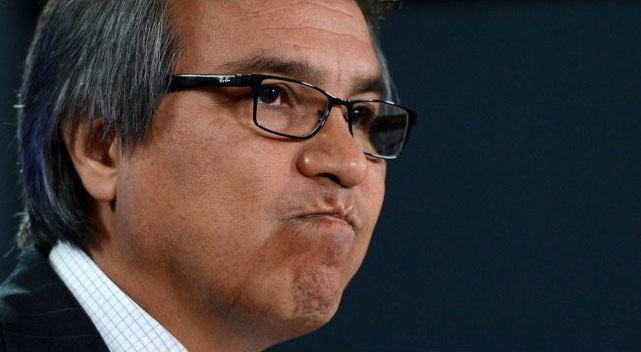UN reports on over 1000 murdered First Nations Women in Canada
The Royal Canadian Mounted Police has confirmed that there have been more than 1,000 murdered Aboriginal women over the past three decades, prompting First Nation groups to renew calls for an inquiry - something the government has steadfastly refused to do.

Sean Kilpatrick/Canadian Press
CBS News (Edited) 12 May 2014
The United Nations released a report outlining Canada's "continuing crisis" when it comes to the treatment of Aboriginal people, and recommendations on how to ensure their rights are protected.
The much-anticipated report is the culmination of a UN fact-finding mission from last October.
James Anaya, UN special rapporteur on the rights of Indigenous peoples, spent nine days visiting Aboriginal communities across Canada, as well as meeting with government representatives, to take stock of the plight of Aboriginal people in the country.
In an advance unedited version released on May 7, Anaya wrote that treaty claims "remain persistently unresolved, Indigenous women and girls remain vulnerable to abuse, and overall there appear to be high levels of distrust among Indigenous peoples toward government at both the federal and provincial levels."
The report is "awaiting minimal edits by the documentation unit of the United Nations but these will not affect substantive observations or conclusions," according to the UN Office of the High Commissioner of Human Rights.
These findings are in line with preliminary observations he made in the fall.
The advance report outlined a number of recommendations to improve relations between the Canadian government and Aboriginal people, including the call for a national inquiry into missing and murdered Aboriginal women.
Last week, the Royal Canadian Mounted Police (RCMP) confirmed there have been more than 1,000 murdered Aboriginal women over the past three decades, prompting Aboriginal groups to renew calls for an inquiry - something the government has steadfastly refused to do.
Report cites pipeline concerns
... Indigenous nations' efforts to protect their long-term interests in lands and resources often fit uneasily into the efforts by private non-Indigenous companies ...

James Anaya, the UN special rapporteur
(United Nations)
The report also recommends the government get consent from Aboriginal groups before moving forward with resource extraction projects on land subject to Aboriginal claims. That would include pipeline projects currently in the works, such as Enbridge's controversial Northern Gateway pipeline.
"While Indigenous peoples potentially have much to gain from resource development within their territories, they also face the highest risks to their health, economy, and cultural identity from any associated environmental degradation," reads the unedited version of the preliminary report.
"Perhaps more importantly, Indigenous nations' efforts to protect their long-term interests in lands and resources often fit uneasily into the efforts by private non-Indigenous companies, with the backing of the federal and provincial governments, to move forward with natural resource projects."
Anaya wrote that the concerns of Aboriginal people merit higher priority at all levels and within all branches of government, and across all departments, especially considering the relationship between Aboriginal people and the government is "perhaps even more" strained since the last UN special rapporteur visit in 2003, which produced a report for the following year.
"The most jarring manifestation of these human rights problems is the distressing socio-economic conditions of Indigenous peoples in a highly developed country," the report reads.
Despite the UN's 2004 recommendations for Canada to ramp up efforts to close the gap between Indigenous and non-Indigenous Canadians when it comes to health care, housing, education, welfare and social services, "there has been no change in that gap in the intervening period in relation to registered Indians/First Nations."
Federal government to review report
In a statement, Aboriginal Affairs Minister Bernard Valcourt said despite these challenges, the federal government has taken many steps "to improve the overall well-being and prosperity of Aboriginal people in Canada."

(Fred Chartrand / The Canadian Press)
"Our government is proud of the effective and incremental steps taken in partnership with Aboriginal communities. We are committed to continuing to work with our partners to make significant progress in improving the lives of Aboriginal people in Canada. We will review the report carefully to determine how we can best address the recommendations," he said.
Monday's UN final report was released at a fragile time for relations between the federal government and First Nations peoples.
The government put "on hold" its prized but controversial First Nations education bill following the sudden resignation of Shawn Atleo as national chief for the Assembly of First Nations.
Bill C-33 will stay on hold until the AFN "clarifies" its position on the bill which it is expected to do during a special assembly of national chiefs in Ottawa on May 27.
Anaya's term as UN special rapporteur on the rights of Indigenous peoples comes to a close at the end of the month.
The UN Human Rights Council confirmed on May 8 that Vicky Tauli-Corpuz, of the Philippines, will replace Anaya beginning June 1.

James Anaya, the UN special rapporteur, says Canada's First Nations communities are in crisis.
(Sean Kilpatrick / The Canadian Press)
The Canadian Press (Edited) 15 Oct 15 2013
Ottowa - The federal government should set up a national inquiry into the "disturbing phenomenon" of missing and murdered aboriginal women, a senior UN rights official said Tuesday.
James Anaya, the UN special rapporteur on the rights of indigenous peoples, has spent the last nine days touring the country, talking to aboriginals and both federal and provincial government officials.
And while governments across Canada have pledged a number of steps to deal with the problem of missing aboriginal women, it's not enough, Anaya told a news conference in Ottawa as he wrapped up his visit.
"I have heard from Aboriginal Peoples a widespread lack of confidence in the effectiveness of those measures," Anaya said.
"I concur that a comprehensive and nationwide inquiry into the issue could help ensure a co-ordinated response and the opportunity for the loved ones of victims to be heard and would demonstrate a responsiveness to the concerns raised by the families and communities affected by this epidemic."
There has been strong pressure from aboriginal groups and some provinces for an inquiry into the disappearances, which some say run into the hundreds. The Native Women's Association of Canada estimates there have been more than 600 such cases in the last 20 years.
James Anaya said Tuesday a national inquiry into missing and murdered aboriginal women would ensure a co-ordinated response to the problem and allow the families of victims to be heard.
The federal government, however, has so far refused to entertain the idea of an inquiry.
Anaya, a professor of human rights law at the University of Arizona, also has a Canadian connection, having done several stints as a visiting professor in the law faculty of the University of Toronto.
He acknowledged that Canada has made significant progress on aboriginal issues since his predecessor delivered a tough report in 2004. But many challenges remain, he said.
The economic gap between aboriginals and non-aboriginals hasn't narrowed, treaty and land claims remain unresolved and "there appear to be high levels of distrust among Aboriginal Peoples towards government at both the federal and provincial levels."
Liberal aboriginal affairs critic Carolyn Bennett pounced on Anaya's report as evidence of a hard-hearted Conservative attitude toward Canada's First Nations.
"The Conservatives' adversarial approach to Aboriginal Peoples on a host of issues has created conflict and distrust, rather than reconciliation and better lives," Bennett said.
Anaya also noted that aboriginal education in Canada could be improved quickly if money given to native authorities for schooling was equal, on a per-student basis, to spending in the provincial system.

